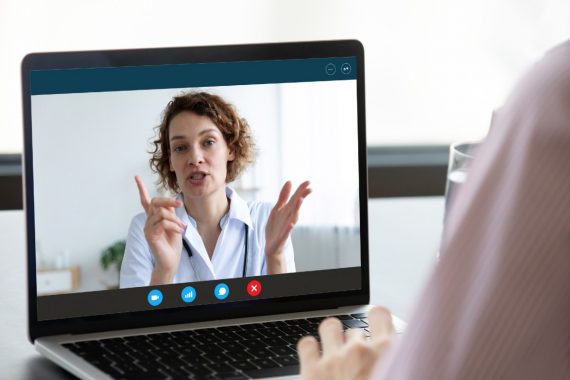Remote GP consultations ‘should be recorded and reviewed for quality control’

Researchers have recommended that reviewing the audio of recorded remote GP consultations should be used routinely as a way to assess quality of care.
A team who listened back to a proportion of phone consultations done by GPs working in the Covid-19 clinical assessment service (CCAS) during the pandemic to provide ‘clinical assurance’ said the approach had worked well and could be used more widely.
The CCAS was run by the South Central Ambulance Service (SCAS) NHS Foundation Trust and delivered by 1,500 GPs who were tasked with the clinical assessment, management and/or referral of patients identified through NHS 111 as potentially having Covid-19.
In all, the team assessed more than 500,000 patients between March 2020 and May 2021 and 5,700 of those were reviewed by a team of clinicians.
Rather than looking at the quality of clinical performance through measures such as the completeness of written notes, the length of consultations, onward referral rates or referral destinations, clinician reviewers listened to the recorded audio of consultations themselves.
They wanted to assess factors such as the rapport between practitioners and their patients, the presence of shared decision-making and whether or not best practice is being followed.
Writing in The Lancet, the team who worked for the SCAS said the ability to record and review consultation audio had benefits not only for organisational quality assurance and complaint and incident investigation but also provided ‘meaningful feedback to support clinicians’ continuous professional development’.
The same model of review was used when the follow-up version of the service – CCAS2 – was reintroduced in January 2022 to manage a surge of infections due to the Omicron variant.
The team at the SCAS concluded that by investing in this approach, provider organisations can add value to patient care ‘by both assuring quality and continuously improving it’.
Dr Kathy Smith, a GP and lead author, said they found that consultation audio review provided a unique insight into a clinician’s practice not otherwise afforded once they have completed clinical training.
She said: ‘This includes the structure of the consultation, the building of rapport, proportionate data gathering, shared decision-making and implementation of best practice.
‘In turn, this enables high-quality, insightful and individualised feedback to be regularly provided to practising GPs, reinforcing best practice and supporting their development.’
As a result of audited practice in this way, Dr Smith said they would now question whether the metrics commonly used for clinical performance review in unscheduled care, such as average call length and peer-referenced referral rates are a meaningful reflection of quality and safety of care.
She added: ‘As evidenced by the interest we have received from other healthcare providers, we believe that we are not alone in this perception and there is a real feeling that this work could help transform remote GP consultations by supporting clinicians in their endeavour to provide the highest quality consultation to the patients that they serve.’
RCGP chair Professor Martin Marshall said: ‘As GPs, we strive to deliver high-quality, safe patient consultations regardless of the mode of access. We are trained to reflect on our work and where necessary adapt accordingly and receiving and acting on feedback is a key part of this.
‘What’s important is that any feedback is delivered in a constructive way and in the spirit of encouraging improvement in the best interests of the care we deliver to patients.’
He added: ‘It makes sense that as the way we deliver care evolves, so does the way we receive feedback. To this end, the results of this study are very interesting, and the College will be interested to see further work in this area.’
Pulse July survey
Take our July 2025 survey to potentially win £1.000 worth of tokens

Related Articles
READERS' COMMENTS [5]
Please note, only GPs are permitted to add comments to articles











Remote consultations re recorded in OOH for a long time, and since Sajid Javed and the Daily hail demand that GPs see patients in person, It would be very costly to record a few telephone consults.
THERE IS AN OBESSION WITH MICROMANAGING GPs AND IT IS GETTING INCREASINGLY RIDICULOUS…….THIS WILL BE “GRABBED” BY THE DAILY NUTTER (A “CRIMINAL ENTERPRISE WHOSE RAISON D’ETRE IS TO BE THE GOVERNMENTS PET ENFORCER)……AS “PROOF” OF GPs EVIL INC0MPETENCE…….AND LIKELY CLAIM THAT CONSULTATIONS ARE BEING DONE REMOTELY FROM THE GOLF CLUBHOUSE OR SOME SUCH SHIT…..OR VIA WIFI FROM THE GP BENTLEY……
As should a politicians private meetings with Americans. Not long for the Panorama documentary. Plenty of whistleblowers about.
‘Confidentiality. ‘ Now there’s unfashionable concept,
There is a huge difference in giving feedback between saying “you did very well with no significant issues highlighted”
AND
Being critical (now called personal development) for criticism sake.
“you could have done x better, and it could have been improved had you suggested y, and endless other criticism.”
Reviewers look at things in the cold light of infinite time rather than the endless 10min slot pressures, and the delays caused by the 1hr+ spent trying to admit a patient or submit a neuro referral, the 25min call on mental health problem.
Most reviewers seem to spend their time looking for faults and improvements, to justify to themselves and their own time spent. This output is thereby reduced to criticism..